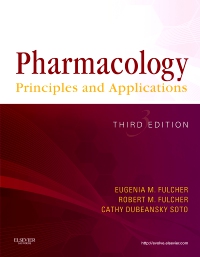
Pharmacology, 3rd Edition
Paperback

Now $87.41
Comprehensive yet easy to read, Pharmacology: Principles and Applications, 3rd Edition introduces you to basic pharmacology, showing how to apply principles to the kinds of clinical situations you will encounter on the job. You'll learn how different drugs work in the body, how to calculate drug dosages, drug administration routes and procedures, the medications related to disorders in each body system, and much more. Written by expert authors Eugenia M. Fulcher, Robert M. Fulcher, and Cathy Dubeansky Soto, Pharmacology ensures that you master all of the pharmacology competencies required by CAAHEP and ABHES. In the book and on a companion Evolve website, a variety of exercises helps you strengthen your skills in math, dosage calculation, and critical thinking.
-
- Practical coverage of basic pharmacology provides a thorough understanding of the medications most commonly used in ambulatory and inpatient settings.
- A real-life Scenario starts each chapter with thought-provoking questions to consider as you progress through the material.
- Procedures boxes provide step-by-step guidance for drug calculation and administration, accompanied by numerous illustrations and icons that identify OSHA-mandated protocols.
- Common Signs & Symptoms of Diseases and Common Side Effects of Medications lists in each body system chapter help you distinguish between disease progression and medication reactions.
- Body systems icons highlight the ways that specific drugs affect a particular body system.
- Chapter objectives and key words at the beginning of each chapter help you focus your study efforts.
- Check Your Understanding math review sections enable you to assess your knowledge of application and calculation concepts.
- Critical Thinking exercises challenge you to apply what you've learned to a variety of realistic situations.
- Important Facts and Clinical Tips boxes in each chapter highlight the key concepts for practice.
- Patient Education for Compliance boxes help you communicate more effectively with patients about possible side effects or adverse reactions.
-
- An expanded math section helps you sharpen your calculation skills with a wealth of practice problems.
- Additional drug calculation coverage includes more dosage and calculation practice exercises
- Expanded pediatric content offers a more thorough understanding of the special dosage and calculation considerations required for this special population.
-
Section 1: General Aspects of Pharmacology
1. Legal and Ethical Aspects of Pharmacology
2. Basics of Pharmacology
3. Drug Information and Drug Forms
4. Understanding Drug Dosages for Special Populations
5. Reading and Interpreting Medication Labels and Orders and Documenting AppropriatelySection 2: Mathematics for Pharmacology and Dosage Calculations
6. Math Review
7. Measurement Systems and Their Equivalents
8. Converting Between Measurement Systems
9. Calculating Doses of Nonparenteral Medications
10. Calculating Doses of Parenteral Medications
Section 3: Medication Administration
11. Safety and Quality Assurance
12. Enteral Routes
13. Percutaneous Routes
14. Parenteral Routes
Section 4: Pharmacology for Multisystem Application
15. Analgesics and Antipyretics
16. Immunizations and the Immune System
17. Anitmicrobials, Antifungals, and Antivirals
18. Antineoplastic Agents
19. Nutritional Supplements and Alternative Medicines
Section 5: Medication Related to Body Systems
20. Endocrine System Disorders
21. Eye and Ear Disorders
22. Drugs for Skin Conditions
23. Musculoskeletal System Disorders
24. Gastrointestinal System Disorders
25. Respiratory System Disorders
26. Circulatory System and Blood Disorders
27. Urinary System Disorders
28. Reproductive System Disorders
29. Neurological System Disorders
30. Drugs for Mental Health and Behavioral Disorders
31. Drugs of Abuse and Misuse
Appendices
A. Check Your Understanding Answers
B. Drug-Nutrient and Drug-Drug Interactions
Glossary




 as described in our
as described in our 